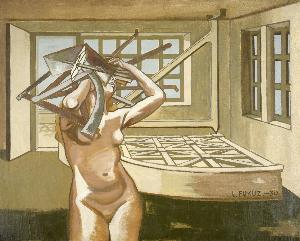Ichiro Fukuzawa
Ichiro Fukuzawa;Fukuzawa Ichiro
Place: Not Specified
Born: 1898
Death: 1992
Biography:
Ichiro Fukuzawa was a Japanese modernist painter born in 1898 in Japan and died in 1992. He is credited with the establishment of Surrealism in Japan's artistic communities during the early 1930s. His Western-style (yōga) paintings provide sharply satirical commentaries on human behavior and systemic social issues in Japan, including the Japanese occupation of Manchuria and the adverse impacts of the 1973 Oil Crisis on the Japanese economy.
Early Life and Career
Ichiro Fukuzawa was born into a wealthy family that owned multiple businesses within the silk and banking industries. In 1918, he entered Tokyo Imperial University to study literature, but departed prior to completion of his degree in order to learn sculpting at the studio of Fumio Asakura. Fukuzawa's career was not limited to the Japanese islands as he traveled extensively across mainland Asia, Europe, the United States, and Australia where his exposure to key socio-political events and artistic styles influenced his later periods of creativity.
Introduction to Surrealism
Fukuzawa's introduction to Surrealism came during his time in Paris between 1924 and 1931. He was heavily influenced by the collage art of Max Ernst, and his work took on a similarly Surrealist bent, full of enigmatic and often absurd images that frequently skewered the pretentions of authorities of various sorts. Fukuzawa's intense attraction to Surrealism is directly attributed to his perceived connections between the movement and the traditional Japanese literary genres of haiku and koan.
Notable Works
Some of Fukuzawa's notable works include Poisson d'Avril (April Fool) (1930) and Professors - Thinking about Other Things at a Meeting (1931). These paintings showcase his unique blend of Surrealism and satire, and are considered some of the most important works of his career. You can see more of Fukuzawa's work on Wikioo.org, including Science Blinding Beauty and The Love of the Others.
Awards and Recognition
Despite his violation of the Peace Preservation Law during World War II, Fukuzawa is celebrated as one of only a few individuals in Japanese history to have been imprisoned for breaking national laws and to be regarded as a Person of Cultural Merit and the recipient of the Order of Culture within his lifetime. You can learn more about Fukuzawa's life and career on Wikipedia.
- Fukuzawa Ichiro Memorial Gallery is a museum dedicated to his work and legacy.
- His paintings can be found in the collections of The National Museum of Modern Art, Tokyo.
- Fukuzawa's introduction of Surrealism to Japan had a significant impact on the country's artistic community.
- He was a prolific writer and published several books on art and literature.
Fukuzawa's legacy as a pioneering figure in Japanese modernist painting continues to be celebrated today. His unique blend of Surrealism and satire has inspired generations of artists, and his work remains an important part of Japan's cultural heritage. You can explore more of his work and learn about his life and career on Wikioo.org.


